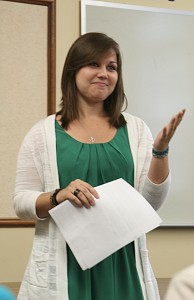By Anne Marie Amacher
The Catholic Messenger
DAVENPORT — An internship with the United States Conference of Catholic Bishops (USCCB) Migration and Refugee Services came at the perfect time for college senior Mary Agnoli of Davenport.

Mary Agnoli talks about her internship at the United States Conference of Catholic Bishops Migration and Refugee Services on Aug. 4 at diocesan headquarters in Davenport.
The Assumption High School graduate who will be a senior at Loras College in Dubuque said the news blitz of undocumented Central American children crossing the U.S. border kept her busy during June and July.
During her internship, Agnoli spent about half her time learning and helping USCCB departments regarding family reunification and foster care.
“About 95 percent of those crossing the border are wanting to be reunified with family in the United States,” she said during a luncheon program at the Diocese of Davenport offices Aug. 4.
On the foster care side of the program she said Migration and Refugee Services works to find families or sponsors who will care for children without families in the U.S.
As part of her internship, she attended the national migration conference held every five to seven years, read case referrals, and was in contact with organizations in the Washington, D.C., area to help put together a best practices kit.
Agnoli provided her Davenport audience with figures about undocumented people, mostly children, who have been crossing the border. From 2009-11 about 6,000 children crossed the border per year. By 2012 that number grew to 13,000 children per year entering the U.S. Last year about 25,000 children came across. The estimate for 2014 — 60,000 children — has already been exceeded and the projected total has been raised to 100,000 children.
“The system was not built to handle this many children,” she said, referring to everything from border patrol to agencies involved in reunification.
In the past, Agnoli said, immigrants from Central and Latin America typically came to the U.S. for economic opportunities or family reunification. “Now it’s more of a refugee crisis. I have read case files. Most of these children have been threatened by gangs, abused at home or along the way, and even raped.”
When unaccompanied children in particular cross the border into the U.S., they don’t attempt to flee from border patrols, but go directly to the agents for help. “They are scared for their lives,” she said.
Agnoli noted that President Barack Obama had asked for $3.7 billion to help with the situation. A divided Congress rejected the request. Now the government is looking to pull funds from other sources such as the trafficking act and refugee resettlement.
The administration has issued public service announcements in Latin America telling people it is too dangerous to come to the United States. Agnoli said families still believe it is safer to attempt a crossing than to remain in their home country.
“It’s very grim out there,” Agnoli said. So what can be done?
Look for resources. It has been reported that 122 undocumented children have relocated to Iowa from January to July of this year. “They know that the Church can be trusted,” Agnoli said. She encouraged Iowa agencies to have resources ready if approached for help.
Deacon Frank Agnoli, Mary’s father who works for the Davenport Diocese, offered a scenario. “What if someone came to a parish stating their niece just came here from Guatemala and they wanted to know how to enroll her in school. Where can they find a doctor or mental health professional? What can we do?”
Kent Ferris, diocesan director of social action and Catholic Charities, said, “We have to be there and be able to respond.” He and his staff and volunteers say Scott County is rich with resources, but that’s not the case for the other 21 counties in the diocese.
Deacon Agnoli encouraged the Social Action office to keep parishes informed and to work with them to know what services are available in their areas.
Since the public has become aware of the unprecedented number of undocumented immigrant children arriving in the U.S., Ferris said email volume in his office has tripled. “I’m not exaggerating.”
After her internship experience, Mary Agnoli said she would possibly like to work in migration or refugee services, but on a more direct-service level. She hasn’t ruled out graduate school or giving a year of service before entering the workforce. “We’ll just see how my senior year goes first.”








